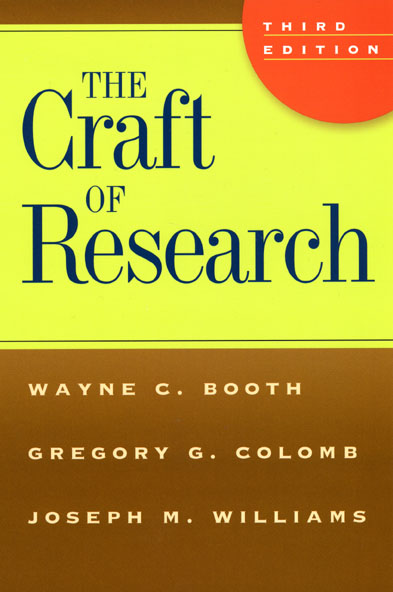The Craft of Research: A Comprehensive Guide for Writers of Theses and Papers
Introduction
They Say: Many believe that research is a solitary endeavor, a silent pursuit of knowledge. I Say: However, effective research is a dynamic conversation between the researcher and the broader academic community.
This manual offers a comprehensive guide to the research process, from conceptualization to final presentation. It provides practical advice on crafting compelling research questions, conducting thorough literature reviews, designing effective research methodologies, analyzing data, and writing clear and concise research papers. By adhering to the principles outlined in this manual, researchers can produce high-quality work that contributes to their field of study.
Part I: The Research Process
1. Defining the Research Question
They Say: Many students struggle to formulate a clear and focused research question. I Say: A well-defined research question is the cornerstone of a successful research project.
- Identifying a Research Topic:
- Personal interest
- Academic requirements
- Current trends and debates
- Formulating a Clear and Focused Research Question:
- Specific, Measurable, Achievable, Relevant, and Time-bound (SMART)
- Open-ended or closed-ended
- Avoid overly broad or narrow questions
2. Conducting a Literature Review
They Say: Some researchers may overlook the importance of a thorough literature review. I Say: A comprehensive literature review provides a foundation for your research and helps you identify gaps in the existing knowledge.
- Identifying Relevant Sources:
- Academic databases (e.g., JSTOR, Google Scholar)
- Library catalogs
- Online resources (e.g., government websites, think tanks)
- Evaluating Sources:
- Credibility of the author(s)
- Publication date
- Peer-review process
- Bias and objectivity
- Synthesizing Information:
- Summarizing key points
- Identifying patterns and contradictions
- Developing a coherent argument
3. Designing the Research Methodology
They Say: The choice of research methodology can significantly impact the validity and reliability of your findings. I Say: A well-designed research methodology ensures that your research is rigorous and ethical.
- Choosing a Research Design:
- Quantitative research (e.g., surveys, experiments)
- Qualitative research (e.g., interviews, case studies)
- Mixed-methods research
- Developing Research Instruments:
- Questionnaires
- Interview protocols
- Observation checklists
- Sampling Techniques:
- Probability sampling (e.g., random sampling)
- Non-probability sampling (e.g., convenience sampling, purposive sampling)
4. Data Collection and Analysis
They Say: Data collection and analysis can be time-consuming and complex processes. I Say: Rigorous data collection and analysis are essential for drawing valid conclusions.
- Data Collection Methods:
- Primary data collection (e.g., surveys, interviews)
- Secondary data collection (e.g., archival research, document analysis)
- Data Analysis Techniques:
- Quantitative analysis (e.g., statistical software)
- Qualitative analysis (e.g., thematic analysis, discourse analysis)
Part II: Writing the Research Paper
5. Organizing the Research Paper
They Say: A well-structured research paper is easier to read and understand. I Say: A clear and logical structure helps you convey your ideas effectively.
- Creating an Outline:
- Introduction
- Literature review
- Methodology
- Results
- Discussion
- Conclusion
- References
- Structuring the Introduction:
- Hook
- Background information
- Research question
- Thesis statement
- Overview of the paper
6. Writing Clear and Concise Prose
They Say: Academic writing can be dense and difficult to follow. I Say: Clear and concise writing is essential for effective communication.
- Active Voice: Use active voice to make your writing more direct and engaging.
- Concise Language: Avoid unnecessary words and phrases.
- Clear and Coherent Argumentation: Develop a strong argument and support it with evidence.
- Academic Style and Tone: Maintain a formal and objective tone.
7. Citing Sources Correctly
They Say: Academic integrity is paramount in research. I Say: Proper citation of sources ensures that you give credit to the original authors and avoid plagiarism.
- Choosing a Citation Style:
- APA
- MLA
- Chicago
- Harvard
- In-Text Citations:
- Referencing sources within the text
- Reference List:
- Formatting citations according to the chosen style guide
8. Editing and Proofreading
They Say: A well-edited paper is more likely to be accepted by academic journals or institutions. I Say: Careful editing and proofreading are essential for producing a polished final product.
- Self-Editing:
- Check for clarity, coherence, and consistency.
- Proofread for grammar, punctuation, and spelling errors.
- Peer Review:
- Seek feedback from colleagues or classmates.
- Consider suggestions for improvement.
- Professional Editing:
- Consult with a professional editor for assistance with language, style, and formatting.
Conclusion
They Say: Research is a challenging but rewarding endeavor. I Say: By following the guidelines outlined in this manual, researchers can navigate the complexities of the research process and produce high-quality work.
Effective research requires careful planning, rigorous analysis, and clear communication. By mastering these skills, researchers can achieve their academic goals and make a meaningful impact on their discipline.
References
- Booth, W. C., Colomb, G. G., & Williams, J. M. (2016). The Craft of Research. University of Chicago Press.
- Turabian, K. L. (2018). A Manual for Writers of Research Papers, Theses, and Dissertations. University of Chicago Press.
- American Psychological Association (APA). (2020). Publication Manual of the American Psychological Association (7th ed.). American Psychological Association.
- Modern Language Association (MLA). (2021). MLA Handbook (9th ed.). Modern Language Association of America.
Note: This is a general guide, and specific requirements may vary depending on the field of study and institutional guidelines. It is essential to consult with your advisor or instructor for any specific questions or concerns. Contact ias-research.com for details.



